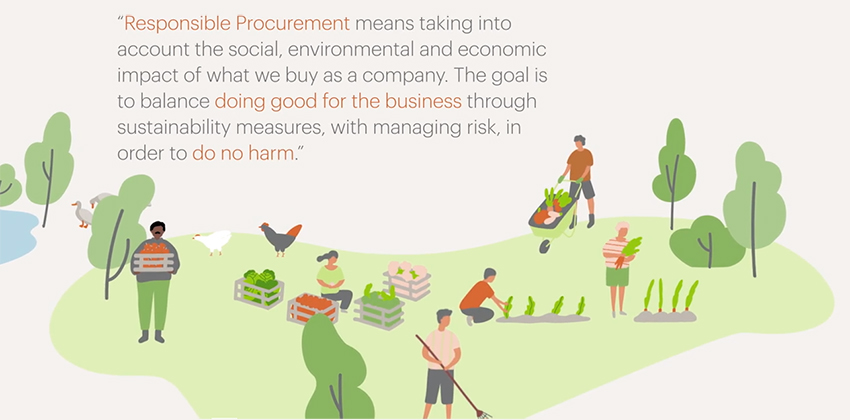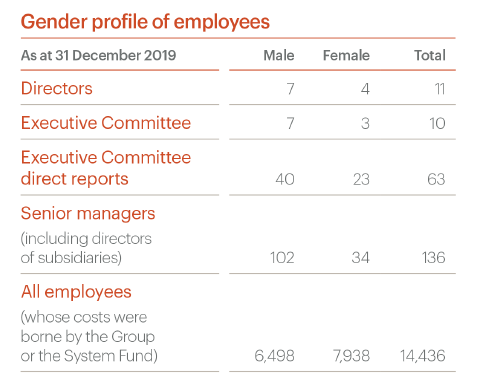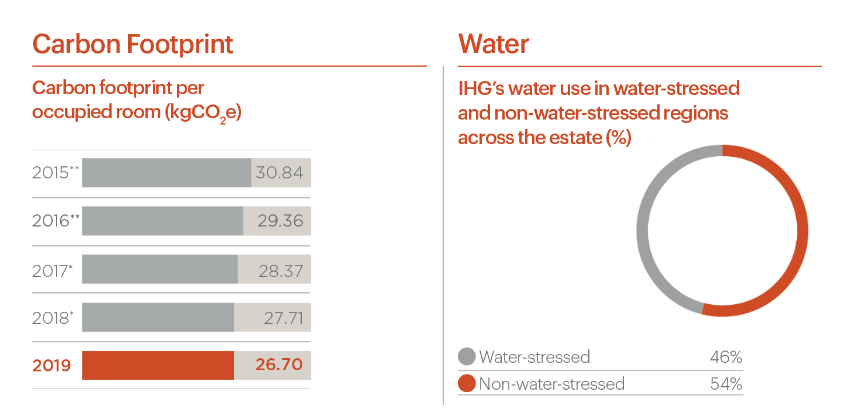
Interview: Responsible sourcing and risk management goes hand-in-hand


(Pic Courtesy: IHG)
One would normally associate green procurement or sustainability with companies operating in carbon-heavy industries. Even though it is not widely known, the hospitality industry also seeks ways to implement green sourcing methods.
In an exclusive interview with Beroe, Laura Simmonds, the head of Responsible Procurement and Supply Chain Risk at InterContinental Hotels Group (IHG), spoke at length about the inner workings of her Responsible Procurement team that aims to ensure that the company protects and enhances its reputation as a responsible business.
IHG is one of the world’s leading hotel companies, with a diverse portfolio of 16 hotel brands operating in more than 100 countries. The company’s portfolio includes marquee brands such as Intercontinental, Holiday Inn, Crowne Plaza, and Regent.
The conversation kicked off on an unconventional note. “I am actually very new to the world of responsible procurement,” Laura said in a serene tone devoid of irony.
When asked to elaborate, she clarified that she didn’t start her career in Procurement but joined the function a few years ago, working on the department’s transformation.
Laura’s forte is strategy development and project management. During the procurement transformation project, she developed an interest in the function and learned about it extensively.
Later, IHG decided to constitute a team to look after green procurement and ethical sourcing.
“I had such an interest in the world of Procurement, and coupled with sustainability and risk, I thought the new role was perfect for me. What appealed to me most was the fact that ‘responsible procurement’ was quite new for the company. So, I saw a huge opportunity to make an impact in the role,” Laura said.
The Process
Laura’s team is embedded within the Procurement function, and she reports to IHG’s CPO. This model is slightly different compared to other companies.
“There is significant value in placing responsible sourcing within the ambit of the Procurement function, as it enables my team to better assist my sourcing colleagues in meeting their sustainability goals,” she explained.
Green Procurement teams, in general, face high degrees of resistance from other stakeholders when it comes to implementation of certain practices. However, that is not the case with IHG.
“The challenge for my team is to educate and equip our procurement colleagues on what responsible procurement means in practice. Responsible Procurement, particularly Sustainability, is new for our colleagues in sourcing teams. Understandably so, as their focus is on identifying best-fit suppliers, contract negotiation, and supplier relationship management. Amidst all this, bringing sustainability into the conversation with suppliers is new to them. We were met with a lot of intrigue, but I had a high degree of engagement with people who were keen to learn,” Laura said.
Another challenge is to achieve the requisite balance: who is responsible for what and to what extent.
According to Laura, she has structured her team as a Centre of Excellence (CoE), who can help the category teams—in the form of guidelines and documentations—on the nuances of responsible procurement.
“The education aspect is very important to us,” she added.
Screenshot of Educational Video Created by Laura’s Team at IHG

(Source: IHG)
Some of the initiatives her team worked on relate to water conservation. For example, they sourced “low flow shower heads” in hotel bathrooms to save water. The team also works with suppliers whose products have an indirect impact on water—for example, detergents that use less water while washing linens and towels.
In addition to water, an important current initiative is “Bulk Amenities”, following IHG’s commitment to remove bathroom miniatures from all their hotels globally by the end of 2021.
“We made a commitment last year to use bulk bottles instead of small bottles. We’re focused on working with our supply base to identify the solutions and are collaborating with our Brands, Operations and Corporate Responsibility teams on the project,” she said.
Laura’s lean team has in-built the risk and sustainability criteria—such as human rights and environment—into the company’s supplier selection process. All the regular suppliers go through the financial due diligence checks before they sign off on the IHG’s supplier code of conduct. It is essential for suppliers to meet the criteria set by Laura’s team to be eligible to conduct business with IHG.
“We’re also driving our use of Green suppliers. My team developed Green criteria, upon which potential suppliers are assessed against Environmental factors”. In 2019, 45 percent of new contracts that went through a tendering process were awarded to suppliers who were certified by Laura’s team.
“We have set internal targets to increase the percentage of green suppliers,” she said, while adding that the responsibility sits across the procurement function to work with those suppliers and subsequently measure the progress.
In addition to “Green Suppliers,” another important target is to increase the percentage of diverse suppliers. IHG’s spend with diverse suppliers increased by 43 percent in 2019, year on year from 2018.
This may come as a pleasant surprise to many: cost savings is not a target for her team. This inherently avoids conflicts of interest between cost savings and sustainability objectives. The broader procurement function does, however, strive to find that balance between driving sustainability, while achieving value creation for the business through cost targets.
List of Categories at IHG
- Corporate and Indirect Services: Marketing, Consultancy, Financial Services, Legal, and Technology
- Hotel Capital: Furniture, Fittings and Equipment (e.g. beds, chairs, tables, lighting, carpet, signage)
- Hotel Operating Goods: Food and Beverage, Operating Supplies and Equipment (e.g. bathroom amenities, cleaning product, professional kitchen equipment), Energy and Maintenance (e.g. elevator maintenance, Energy grounds maintenance)
Sustainability and Supply Chain Risk
IHG’s supply chain activities can be divided into two categories: corporate supply chain and hotel supply chain.
The corporate supply chain covers items such as technology and professional services. Procurement of goods and services at the hotel level covers items such as food and beverage, furniture, linen, and electrical goods. Procurement predominantly occurs at the local hotel level, with hotels—whether franchised or managed—typically responsible for managing their own independent supply chains.
Following IHG’s 2018 human rights impact assessment, the company has focused on strengthening country-level due diligence on human rights labor risks. The aim was to ensure the effective implementation of policies and procedures while identifying best practices and areas for improvement, especially in relation to migrant workers.
It is not often that we get to see someone managing both sustainability as well as supply chain risk, and Laura is responsible for both tracks at IHG. Why did the company choose to combine both tracks into one role?
Laura posed a counter question: “What would be the point if I work with a supplier who has great sustainability credentials, yet has a patchy human rights record?”
She said it is better to solve the risk piece simultaneously with the sustainability goals. The roles are, however, split within her team. There are experts who work on risk and sustainability, respectively, and and they work closely together towards a common goal.
Moreover, she said that even though her company is in the services sector, there are many items that are externally manufactured—for example, furniture—which are used by the hotel.
“Working with such suppliers to ensure that the production is completed in an ethical manner is an important factor for us,” Laura said.
Some of IHG’s overall goals are:
From 2018–2020:
Environmental Sustainability
- Reduce carbon footprint per occupied room by 6 to 7 percent.
- Launch two water stewardship projects per year. In 2019, the team launched water stewardship projects in Beijing and Bali.
Responsible Procurement
- Supply Chain
Increase the percentage of supplier risk profiles and supplier audits for IHG preferred suppliers.
- Ethical Supplier
Increase the percentage of IHG preferred suppliers that meet IHG Green Criteria. Measured by the number of Ethical Supplier e-learning completions for corporate colleagues and adoption of the Responsible Procurement Toolkit for hotels.
- Green Criteria
Increase the percentage of suppliers that meet IHG’s Green Criteria. Measured by number of suppliers completing an additional questionnaire on their green credentials in addition to the vendor Code of Conduct.
- Increase Diversity
Increase diversity in terms of gender and nationality or ethnicity of IHG’s Senior Leaders. In 2019, female representation in IHG’s Senior Leadership was at 36 percent vs the 2017 baseline of 37 percent. The company’s Executive Committee female membership increased from 22 percent to 30 percent.
Social performance data

(Source: IHG)
Performance Measurement
Laura’s team is broadly measured on the following:
- Number of “Corrective Actions” performed during supplier risk assessment
- Increasing the percentage of Diverse Suppliers in IHG’s supply base (primarily in the U.S.)
- Percentage of new contracts awarded to green suppliers
- Responsible Procurement education, that is, how is her team educating her category and business stakeholders to achieve positive outcomes
Environmental performance data

(Source: IHG)
Conclusion
Responsible Procurement is a key enabler for IHG’s overall Responsible Business strategy and ways of working. Laura’s team have set out on a progressive journey and have already achieved a lot in the short time that the team has been established.
“We have a long way to go yet, as I’m sure many companies do. The focus for me is about identifying where we want to get to, and taking intentional steps to get there; that’s what really drives momentum and enables us to make a positive impact,” Laura said.
March 8, the date of publication of this article, happens to be International Women’s Day. Is Procurement, in general, a women-friendly function?
“Procurement is a wonderful profession for women. There are great opportunities to develop your career and become leaders within the function and the wider business,” she concluded.
Related Insights:
View All
Get more stories like this
Subscirbe for more news,updates and insights from Beroe






